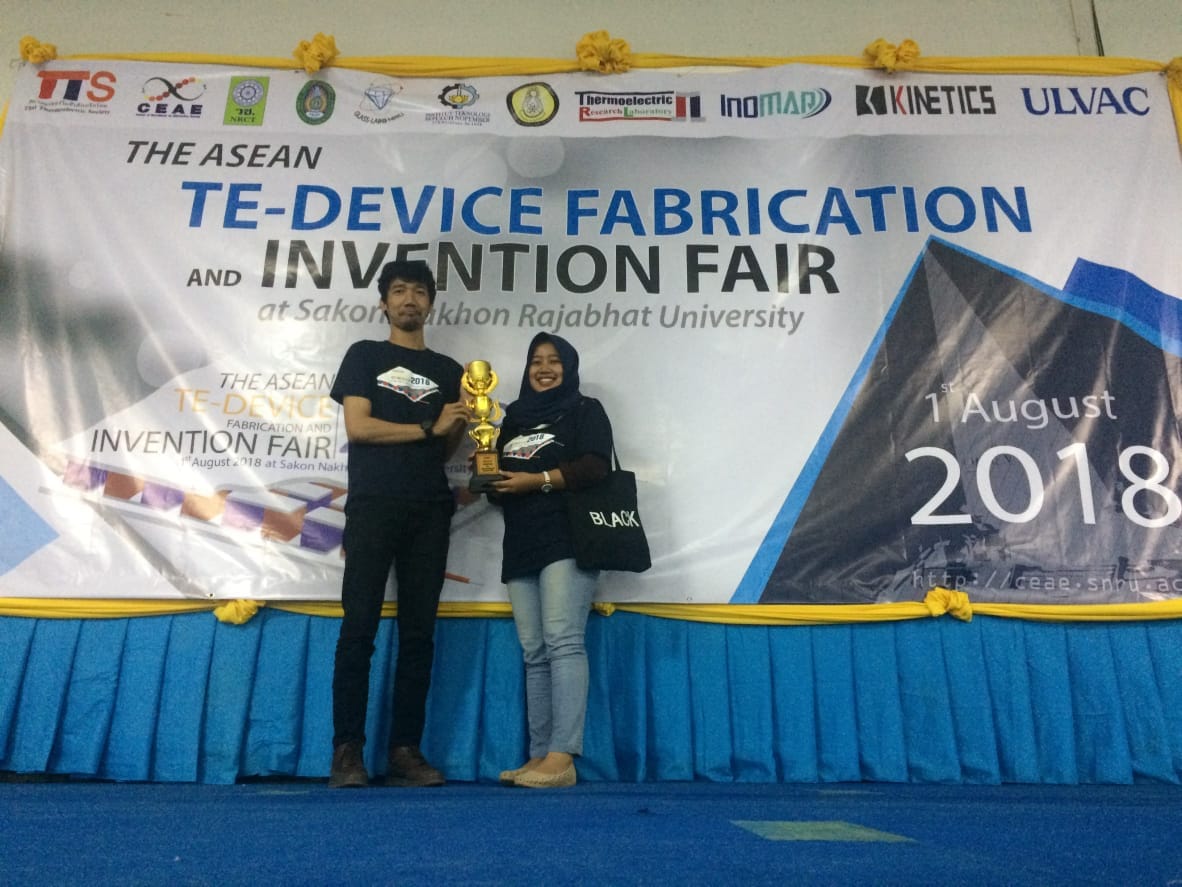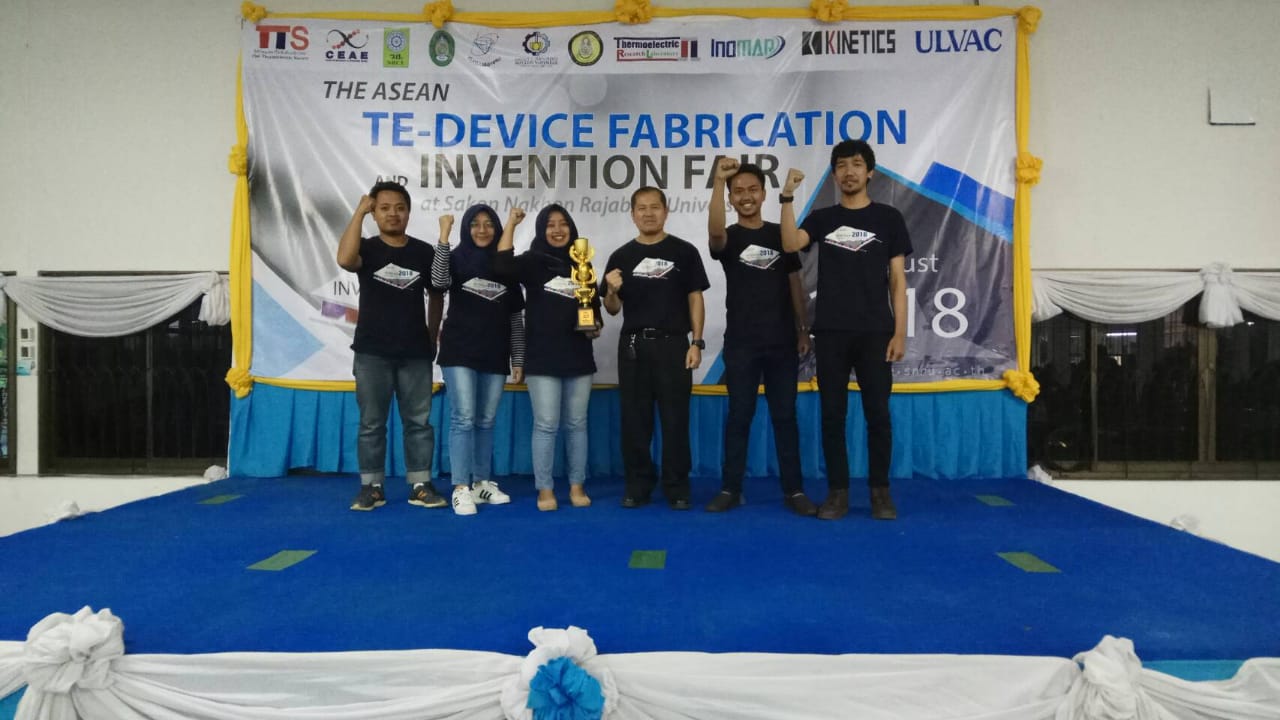Designing A High-Voltage Thermoelectric Module, ITS Students Become ASEAN Champion

ITS Physics students, Aldo and Nensy, won the Gold Prize in The ASEAN Thermoelectric Fabrication Fair in Thailand
ITS Campus, ITS News – The road for students of Institut Teknologi Sepuluh Nopember (ITS) in the world level never seemed to be dim. The good news this time came from the students of Physics Department, namely Elysa Nensy Irawan and Aldo Mahendra Putra, who won the Gold Prize in the ASEAN Thermoelectric Device Fabrication and Invention Fair, beginning in August 2018 at Sakon Nakhon Rajabhat University, Thailand.
Elysa Nensy Irawan, Team Leader from the Department of Physics ITS explained, this competition was organized by Sakon Nakhon Rajabhat University, Thailand. In the competition, student participants consisting of various departments in ASEAN were contested to conduct thermoelectric fabrication so as to produce the greatest power possible.
The competition is divided into two competition categories, namely ‘Thermoelectric Fabrication’ that is open to students in the ASEAN region and an exhibition of ‘Thermoelectric Applications in Everyday Life’ for all high school students in ASEAN. This competition was also attended by 70 teams from several countries in ASEAN. Among them are Indonesia, Myanmar, Laos, and the host country’s team, Thailand. A team consists of two to three members. ITS itself sent two delegates to this competition.
In the race competition, Nensy explained, each team is given a component to compile a thermoelectric module. The components separately consist of alumina, cable, thermoelement, and copper. “And we were given an hour to complete the fabrication process so that the components become a thermoelectric module such as those sold on the market,” she added.
In the fabricating process, according to Nensy, each team is granted the freedom to develop their creativity in how the design, the p-n junctions (a type of semiconductor material), and the packaging from thermoelectric are to be made. After that, the jury will test the power of each thermoelectric that has been made by each team to determine the winner of this competition. “Our team succeeded in winning the competition because it successfully assembled and made the highest voltage thermoelectric module,” said Nensy.
Nensy said, her team’s struggle to win this prestigious competition was not without a hitch.
Their team is constrained because the instruction for the competition is in the Thai language. However, this can be resolved after one of the Thai university professors asked the committee to use English. At that time, there are only 30 minutes left. “But with all the hard work, thank God, our team won,” said Nensy.
Contacted through the international call, Nensy, who is still in Thailand, explained that thermoelectric is an electronic device that can change the temperature difference into electrical energy or vice versa. The sold thermoelectric module devices are usually in the form of a thin plate. One thermoelectric that we can easily get is 40 mm x 40 mm with a thickness of 3 mm and there are two cables (usually red and black).
Compared to vapor compression refrigeration technology, thermoelectrics has various advantages. Such as the heating or cooling that can easily be adjusted by arranging the direction of the current. It is very effective, soundless, and doesn’t need any special maintenance or refrigerants (freon). “Thus, thermoelectric has a huge potential as an alternative energy in the future,” Nensy said, explaining this technology she cited from the module she had learned. (ITS Public Relations Officer)

ITS Delegation with Head of CEAE Laboratory (Center of Excellence on Alternative Energy) Sakon Nakon Rajabhat University, Thailand.
Related News
-
ITS Develops Four‑Legged Dog Robot with Sensors and Navigation
ITS Campus, ITS News – Institut Teknologi Sepuluh Nopember (ITS) is further solidifying its role in robotic technology
August 04, 2018 14:08 -
ITS Mathematics Alumnus Creates EEG-Based Brain Research Technology
ITS Campus, ITS News — One of the graduates of the Institut Teknologi Sepuluh Nopember (ITS) has succeeded in
August 04, 2018 14:08 -
ITS Promotes FAST-D Scholarship, Unggul, and Global Excellence Scholarship
ITS Campus, ITS News – Institut Teknologi Sepuluh Nopember (ITS) always shows its commitment in supporting students to develop their best
August 04, 2018 14:08 -
Supporting the Implementation of SPMB 2025, ITS Develops the SENOPATI Platform
ITS Campus, ITS News – Showing its contribution in the field of education, Institut Teknologi Sepuluh Nopember (ITS) has redeveloped a platform
August 04, 2018 14:08
